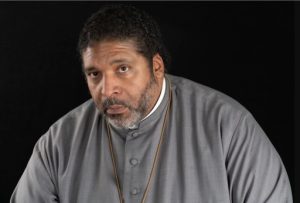By Lee Van Ham
A question many Americans have not wanted to face is pressing itself upon us anyway: how do we respond effectively to Christian nationalism?
Beliefs and opinions of Christian Nationalism are becoming increasingly clear over recent months.
- The belief that the U.S. was founded as a Christian nation.
- Climate science is not to be trusted as it talks about dramatic changes brought about by humans. Why? Because God is in control of the weather.
- Diversity is a threat to the nation. Therefore, there is a strong correlation between Christian nationalists and being anti-Black and Brown, anti-LGBTQ+, antisemitic, anti-immigrant, anti-Muslim and other religions, and being strongly patriarchal.
- Force and violence may well be necessary to impose Christian nationalist views on the country. God has given them the mandate to rule.
- Democracy is standing in the way of their rule of the nation.
In February 2023, the NPR news program All Things Considered reported on Christian nationalism and its foothold in the Republican party. In fact, the non-partisan Public Religion Research Institute (PRRI) and the Brookings Institution released results of their joint survey showing that a majority of Republicans adhere to Christian nationalism or sympathize with it.
The program cited Kristin Kobes Du Mez, a history professor at Calvin University, who emphasizes that Christian nationalism is not a novel ideology in American families.
“These ideas have been widely held throughout American history and particularly since the 1970s with the rise of the Christian Right,” she said.
In Du Men’s view, Christian nationalism is mostly a reaction to changing demographics, as well as cultural and generational shifts in the U.S. As the country has become less white and Christian, she said these adherents want to hold on to their cultural and political power.
In fact, according to the survey, half of Christian nationalism adherents and nearly 4 in 10 sympathizers said they support the idea of an authoritarian leader in order to keep these Christian values in society. (See an article by Ashley Lopez posted on the NPR website https://www.npr.org/2023/02/14/1156642544/more-than-half-of-republicans-support-christian-nationalism-according-to-a-new-s)

Knightopia, CC BY-SA 4.0, via Wikimedia Commons
Clearly, we cannot ignore that Christian nationalism is big. It’s militantly active in this country. It misappropriates the name Christian, a major faith, while being antithetical to Jesus. It rejects science if the finding of science regarding such things as when life begins and climate change disagrees with their ideology. Its racist, misogynist, white supremacist, and patriarchal views directly oppress us, ones we love, and all relations, human and beyond.
Rev. William Barber, co-leader of the Poor Peoples’ Campaign and pastor of a North Carolina church for 30 years, speaks clearly to Christian nationalism when he calls it “theological malpractice” and “heresy.”
Yale Divinity School has announced that Barber has accepted a new position. He’ll be the founding director of its new Center for Public Theology and Public Policy.
In a CNN interview, https://www.cnn.com/2023/01/21/us/william-barber-christian-nationalism-blake-cec/index.html#, William Barber was asked for his response to Christian nationalism and spoke powerfully.
I want to ask you about Christian nationalism. What’s wrong with saying God loves America and that the country should be built on Christian values?
God doesn’t say it. That’s what’s wrong with it. The scriptures say God loves all people and that if a nation is going to embrace Christian values, then we got to know what those values are. And those values certainly aren’t anti-gay, against people who may have had an abortion, pro-tax cut, pro one party, and pro-gun. There’s nowhere in the scriptures where you see Jesus lifting that up.
Jesus said the Gospel is about good news to the poor, healing to the brokenhearted, welcoming all people, caring for the least of these: the immigrant, the hungry, the sick, the imprisoned. Christian nationalism attempts to sanctify oppression and not liberation. It attempts to sanctify lies and not truth. At best, it’s a form of theological malpractice. At worst, it’s a form of heresy.
When you have some people calling themselves Christian nationalists, you never hear them say, “Jesus said this.” They say, “I’m a Christian, and I say it.” But that’s not good enough. If it doesn’t line up with the founder, then it’s flawed.





